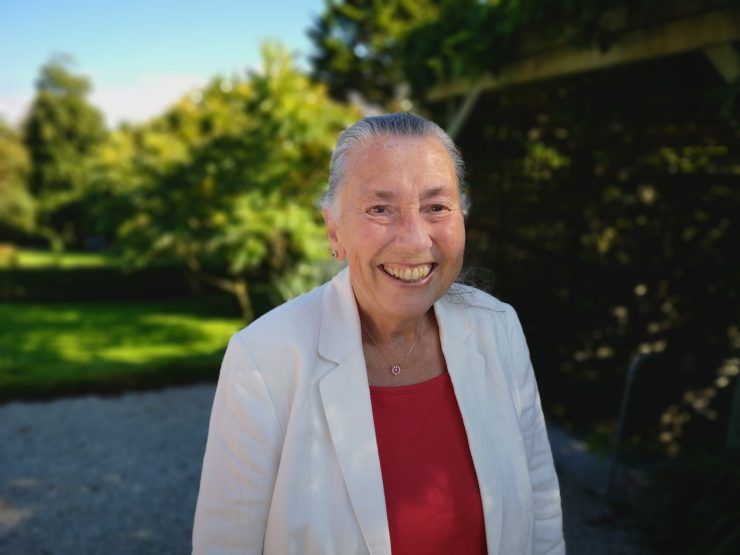Revd Mary West, the vicar who promised to leave church if women were ever ordained
 “If ever I walk into this church and see a woman behind the altar I shall walk out again!” Words spoken, probably loudly, by Revd Mary West to her long-suffering vicar, while God looked on with a wry smile.
“If ever I walk into this church and see a woman behind the altar I shall walk out again!” Words spoken, probably loudly, by Revd Mary West to her long-suffering vicar, while God looked on with a wry smile.
As it turned out, Mary was amongst the first women to be ordained 25 years ago. “I wasn’t the first though. When it came to box-ticking, deacon or priest, the priest box was only for men, as the measure hadn’t yet been passed.” That would come just nine months later in 1992 while Mary was training at theological college in Lincoln.
Suppressed joy at the news of women’s ordination
It was a strange mixture of joy and suppression when the news broke that women could be ordained as priest. The women whooped in their rooms but had to do so quietly out of sensitivity to the men who might not be so thrilled. That evening, when the college came together for a community Eucharist, not a single word or whoop was uttered about the momentous decision.
It’s hard to imagine the landscape for the newly ordained women priests and as Mary explains, it was hard for them to imagine what their ministry would look like in that landscape. “There were so few role models. There was no blueprint. There were deaconesses, many of whom were being ordained, but we were all so new and had to work out our own identity in ministry.” Mary says she had good, and bad, male role models. “I took the best of what I saw from a woman’s point of view.”
Working out a priestly identity
For Mary, working out that priestly identity meant being true to herself, the self that God had called to ordination. “He called me for who I am. I had to be authentically me and not try to be a man!” Mary had been challenged at theological college to look at the identity of God, not as a man or a woman, “But what does that mean?” For Mary, it meant being the person, woman, priest that God called her to be.
But there were plenty of challenges. One male fellow student refused to be ordained alongside her. He became a Roman Catholic and much later, bizarrely, ended up in the same parish as Mary, sharing, or rather not sharing, a Palm Sunday Service. But Mary is pragmatic. “There will be some people who will never accept your holy orders. In the end, if they don’t want my ministry that’s fine, there are plenty of people who do. I think that’s the only thing to say. You can’t carry all that as it will just wear you down.”
There was one thing, however, that Mary did find intolerable. “It irritated me beyond measure when a man, or indeed a woman, would lean in confidentially to say in a low, patronising tone, ‘Of course, it’s nothing personal.’ It’s intensely personal!”
“It irritated me beyond measure when a man, or indeed a woman, would lean in confidentially to say in a low, patronising tone, ‘Of course, it’s nothing personal.’ It’s intensely personal!”
The transformation to Revd Mary West
So how did this feisty, petite woman with fire in her eyes transform from fury at the merest suggestion of a female priest, to an enriched, enlightened priest herself? “I must have been quite a sight, wagging my finger at the vicar, Stephen. He was huge, 6’6’’ and full of charisma. And that was the problem. I’d been away from my home church for a long while and when I came back, I wanted it to be exactly as I left it – traditional, safe and predictable. He was loosening the liturgy, introducing modern music and generally shaking things up.” Ironically, he was doing all the things that Mary would later welcome in her own ministry. His response was to gently tell Mary that maybe she should think of finding another church. Mary was having none of it. It was her church and she wasn’t moving.
A decision that changed her life. “Something in me shifted. Spitting out the ‘… if I ever see a woman…’ released something. Suddenly I had ears that heard and eyes that saw.” Later, Stephen preached about church-goers doing a lot of good things, singing in the choir, getting on the coffee rota but never really understanding what it meant to have a relationship with God. He said that if anyone wanted to invite the Holy Spirit into their life they should stand. “And I stood.”
The power of knowledge
From then on, Mary had a hunger for knowledge. She joined a course about faith and ministry, drinking in all the Bible studies, talks, workshops. Whatever they were offering, Mary absorbed. On one particular set of workshops, Mary listened to a talk on ordination, but thought it wasn’t for her. So she went to one on pastoral assistants, but five minutes in was advised she really should be exploring ordination. Instead, she went to one on Readers, and was again advised to go for ordination. “So, was I going to listen?”
Mary went back to Stephen, her vicar, feeling a little small sat opposite this big presence of a man that she’d wagged her finger at. “I think I’m being called to ordination,” she said. He smiled and said, “You have no idea how long I’ve been waiting for you to tell me that!”
The pain of grief
Seven weeks before the selection conference, Mary’s husband, who was much older than her, said, “You’re so calm. You don’t know what the future holds, where you’ll end up or even how long I’m going to live!” That night he had a heart attack and died next to Mary.
“I didn’t blame God, but I was in complete and utter grief – it’s amazing how your body keeps you going when you really don’t have the strength to move forward.” In her body’s strength or more probably God’s, Mary did move forward to the selection process.
“I knew that God had been opening doors but thought this one would stay closed. I only went forward because the DDO had been so supportive. What had I to offer? I was a widow from a working-class background with no theological training.” Her fears seemed to be confirmed in the very first meeting of the process. It was with Margaret Sentamu, wife of the Archbishop of York, who asked, “Why do you want to be ordained?”
“I flopped! I didn’t know how to answer. I just thought, why do I want to be ordained? I eventually talked about distinctive ministry, but it was mostly blah, blah, blah!” Mary took refuge in the chapel where there was a large sculpture of the resurrected Christ. “I was so angry. I looked at this cross and shouted, ‘What more do you want from me?’”
And the answer came. “That is what I want, I want the last bit of you.”
“That is what I want, I want the last bit of you.”
Wallpaper, strident feminist and stereotyping gender
It was enough. Mary was selected. She loved her training, her incumbency, her first curacy and pretty much everything else that followed. That doesn’t mean it wasn’t hard. A woman stood out, was watched and waited on for the mistakes they were expected to make. Chapter meetings would find Mary a lone woman among men. “If I spoke up, I was considered a strident feminist, if I kept quiet, I was part of the wallpaper, or something easily swotted away.”
Mary also found that people tried to stereotype gender in ministry – if you’re a woman you must be good at pastoral care, if you’re a man you must be a good leader. “I know many men who are great pastors but rubbish leaders and women who are great leaders but not gifted with pastoral skills.” We’re all different. Gender doesn’t define us.
Mary was blessed to remarry after she was priested. “I thought I had done marriage and was now focusing on ministry, and then along came Brian, also a priest.” Mary says her ministry is richer because of him. “We’re so different but it works! I know some people find me difficult – Brian says I’m a bit bossy! But it’s part of who I am. People will respond to the different parts in both of us that make them feel comfortable, not because of our gender.”
Mary has so many wonderful stories: from cabbage soup thwarting her attempts to be a nun; to being taken to church as a child by Mrs. Wilson down the road; to not believing in an interventionist God, despite seeing the twists and turns of her life being a crafted pathway to where she is today.
What Revd Mary West would say to her younger self
So what would Mary say to her younger self? “Don’t try and be something you’re not. It’s about being yourself, about who you are. God uses who are in all sorts of ways that you might not realise.
“And be faithful. There will be many times when you just want to give it all up, throw it all away, but one Bible verse will keep you going, ‘The God who calls you is faithful and He will do it,’ (1 Thessalonians 5:24).”
The God who calls you is faithful and He will do it 1 Thessalonians 5:24
“That has been my focal point. I don’t do it on my own. The older I get the more I realise it’s about the relationship you have with God and the relationship you have with other people. In those relationships it’s God within you that communicates itself to others.”
Revd Mary West will be speaking on Thursday at Epiphany House, Celebrating Women in Ministry.
Written by Jac Smith





